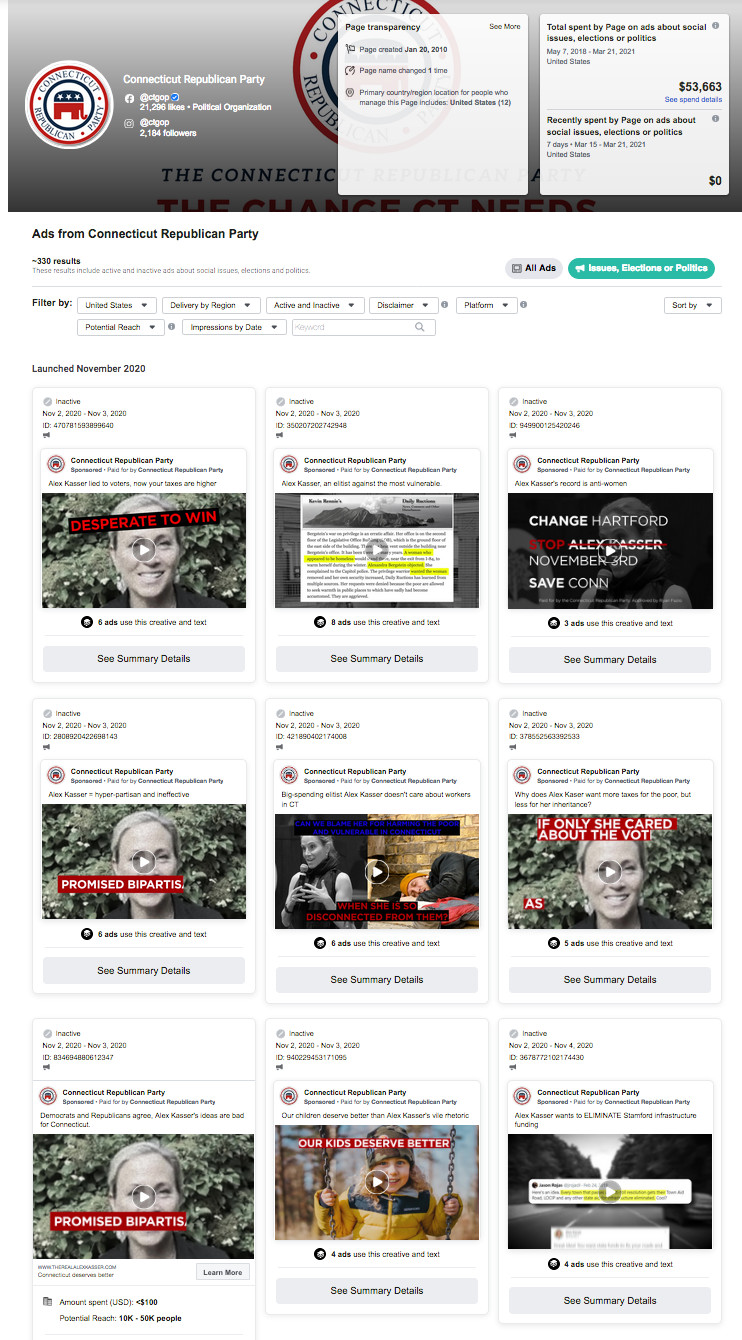Just a few weeks ago the State Election Enforcement Commission (SEEC) agreed to investigate a complaint from Lucy von Brachel against State Rep Harry Arora (R-151) alleging misuse of public campaign funds in both the special election in Jan 2020 and last November’s election.
At its March 17, 2021 meeting, the CT SEEC unanimously decided to investigate a new campaign finance violation complaint.
The complainant, Robert Brady of Greenwich, says the “Fazio for Connecticut” campaign committee, the “Connecticut Republican Party,” their principals and treasurers made and accepted impermissible expenditures and contributions.
In addition to Mr. Fazio respondents include JR Romano (then CT Republican Party chair), Warner Pyne (treasurer of the CT Republican Party), and Joseph L Romano (treasurer of Fazio for Connecticut).
The principal allegations are that principals from CT Republican Party and Fazio for Connecticut knowingly and willfully colluded to violate campaign finance statutes and regulations governing State and CEP candidate committees by characterizing CT Republican Party expenditures for the benefit of Fazio for Connecticut as “organization expenditures” which were in fact in-kind contributions and also exceeding the $11,900 limit on organization expenditures to a participating committee by more than $50,000.
According to the complaint, during last fall’s campaign, the Connecticut Republican Party spent $64,764 on Mr. Fazio’s campaign, and that because his campaign committee was participating in the Citizens’ Election Program (CEP) it was prohibited from accepting such contributions in excess of $11,900 from the Connecticut Republican Party.
Brady’s complaint says that a $64,764 contribution to Fazio’s campaign represented about 37% of its total 2020 spending and 42% of its total reported contributions, a large enough amount to be brought to the attention of the Connecticut Republican Party’s leadership.
Brady said that in addition to simply ignoring the monetary limits imposed upon them by law, the Connecticut Republican Party and Mr. Fazio’s committee misrepresented the expenditures as being “advertising organization expenditures,” but in order to qualify as such, an ad may not “speak negatively about a candidate.”
The complaint says the ads were mainly negative attacks on Fazio’s opponent, incumbent Alex Kasser, and bore the attribution, “Paid for by the Connecticut Republican Party. Approved by Ryan Fazio.”
In 2018 Senator Kasser first won the seat in CT’s 36th district by defeating then Senator Republican Scott Frantz by 600 votes. The 36th district includes Greenwich and parts of Stamford and New Canaan.

The complaint includes Facebook ads as an evidentiary attachment.
….(CT Republican Party) ran a series of Facebook ads criticizing Fazio’s opponent which were not OE’s (operational expenses) because they did not have Ryan Fazio’s approval. These ads are not easily identifiable within the CRP’s Form 20 disclosures, but, for example, in its January 10, 2021 filing, for the period October 16, 2020 through December 31, 2020, the CRP reported 8 payments totaling $6,515.93 to Facebook classified as “none of the below” independent expenditures. Facebook reported that from September 2020 through November 2020, it ran 73 ads at a cost of $53,663for the CRP criticizing Fazio’s opponent. Some of the payments for these may have been classified as OE(a)s which would have been a violation of SEEC’s2011-01 declaratory ruling which provides, inter alia, in that such ads may not “speak negatively about a candidate”
Robert Brady SEEC complaint, March 10, 2021
Wayback Machine Strikes Again
A second evidentiary attachment comes from the WaybackMachine, an archive that works by crawling the internet and “capturing” copies of websites.
The website therealalexkasser.com is no longer active, but WaybackMachine captured copies of it, including on Nov 1 and Nov 4, 2020.
Mr. Brady said whether excess organization expenditures or simply non-qualifying ads, the related expenditures were in-kind contributions by the Connecticut Republican Party of Ryan Fazio’s committee, and are forbidden by CEP rules.
“Whether it is important or not, Ryan Fazio’s relatives contributed $19,250 to the Connecticut Republican Party in 2020, about 14% of its total receipts,” Brady said, adding that because state taxpayers’ money ultimately supports the CEP, participating candidates and their treasurers are properly held to high standards of performance of the obligations they assume when applying for and receiving their campaigns’ grants.
“They are in the role of ‘trustees’ overseeing the handling of the money entrusted to them and following the regulations which they individually agreed to comply with in order to obtain over $100,000 in campaign funding from the state.”
Reached by email on Monday, Mr. Fazio said there was nothing notable about the complaint.
“Everyone around local politics knows that Democrats have recently decided to weaponize campaign finance complaints in order to smear their opposition,” he said. “Any partisan actor can submit them, in hopes of winning one day of negative news headlines and making things momentarily unpleasant for their subjects, even though nothing will come of it.”
“The recent complaint against the state party related to our race is both factually and legally inaccurate,” Fazio continued.
“By contrast, a case against local Democrats in recent years actually resulted in one of the largest fines in state campaign finance history,” Fazio added, referring to the fines levied on Tony Turner and the Democratic members of the Board of Estimate and Taxation.
“The public is going to wonder why Democrats are more interested in smearing opponents without power than governing a state with among the highest COVID mortality, highest unemployment, and worst economic growth in the nation,” he said.
Reached by email RTC chair Dan Quigley said, “It is sad that local Democrats are resorting to smearing Republican office holders and candidates five months after elections with accusations that are totally lacking legal or factual merit.”
Quigley went on to say, “I’m sure if we combed through the campaigns of Ms Kasser, Mr. Meskers and other local Democrats, we would unearth technical or clerical issues that could be spun into headlines regardless of merit.”
Lastly, Quigley said that rather than “wasting our time” with those pursuits, local Republicans were primarily “focusing on Democratic proposals to strip zoning rights and raise taxes on our community.”